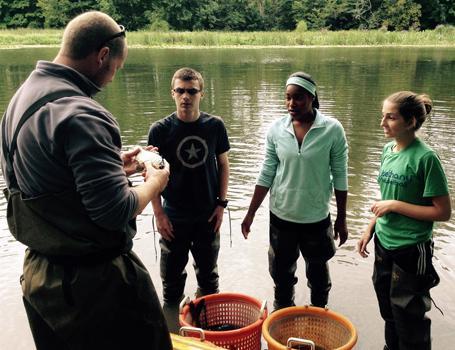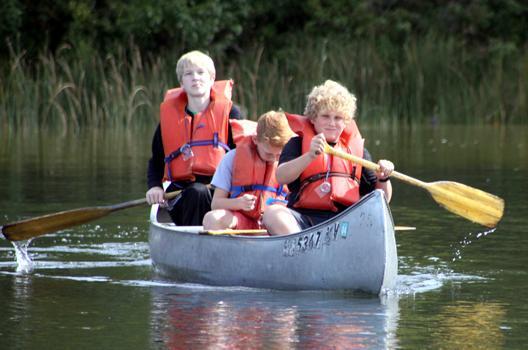See stories by the Goshen News and Elkhart Truth, and read more about Bethany's ongoing sustainability initiatives.
Stewardship: Reducing Environmental Impact
 In 2014, Bethany embarked on a capital campaign focusing on three areas: technology, finances, and environment/energy. The third aspect of this campaign made possible the installation of roof insulation and a full-fledged HVAC system in the old portion of the building to improve indoor air quality and heating efficiencies; a geothermal wellfield for operation of the HVAC system; a 3.6-kilowatt wind turbine; and 300 solar panels that can provide 77 kilowatts of electricity.
In 2014, Bethany embarked on a capital campaign focusing on three areas: technology, finances, and environment/energy. The third aspect of this campaign made possible the installation of roof insulation and a full-fledged HVAC system in the old portion of the building to improve indoor air quality and heating efficiencies; a geothermal wellfield for operation of the HVAC system; a 3.6-kilowatt wind turbine; and 300 solar panels that can provide 77 kilowatts of electricity.
Restrooms were updated with low-flow fixtures, and hallway and parking lot lights were retrofitted with LEDs. Skylights were preserved and enhanced to provide natural lighting. As a result, Bethany has reduced paper use by 31 percent, water consumption by 19 percent, energy consumption by 31 percent, and greenhouse gas emissions by 12 percent. Additionally, Bethany generates 12 percent of its energy needs on campus with wind and solar, and purchases the rest from other wind and solar sources.
Bethany participates in school-wide recycling, accounting for a diversion of 24 percent of waste from the local landfill. Food scraps from the cafeteria are composted and used in the student-tended school garden, which provides fresh produce for the school’s cafeteria and serves as an educational opportunity for students to learn about gardening and sustainable living.
The biannual student-run fish fry fundraiser has become an opportunity to educate students and the general public about sustainable practices. Food scraps and paper products are composted, rather than going in the trash. At the most recent fish fry, 12 cubic yards of compostable material was diverted from the landfill.
Sustainability Education
 In 1993-94 Bethany science teachers Roy Hartzler and Marisa Yoder developed an innovative hands-on Environmental Science curriculum for which Yoder ultimately earned the National Conservation Secondary Teacher-of-the-Year Award from the National Association of Conservation Districts. That vision continues today under the leadership of their former student Amy Thut (’95, F05-), who has built upon their foundational award-winning work, most notably in transforming the school’s retention pond into a native wetlands that is used as an outdoor lab. It is not uncommon to see students in waders collecting water samples to analyze or to examine for aquatic life.
In 1993-94 Bethany science teachers Roy Hartzler and Marisa Yoder developed an innovative hands-on Environmental Science curriculum for which Yoder ultimately earned the National Conservation Secondary Teacher-of-the-Year Award from the National Association of Conservation Districts. That vision continues today under the leadership of their former student Amy Thut (’95, F05-), who has built upon their foundational award-winning work, most notably in transforming the school’s retention pond into a native wetlands that is used as an outdoor lab. It is not uncommon to see students in waders collecting water samples to analyze or to examine for aquatic life.
The primary goal of Environmental Science is to understand the role of humans in affecting and responding to changes in our local and global environment. Special emphasis is placed on our local ecosystems, including wetlands, watersheds, and soil with students assisting local officials in monitoring and assessing the health of the Elkhart River through activities such as electrofishing and water testing. Environmental sustainability issues are reinforced in Bible classes where students study stewardship of resources, including environmental resources such as energy.
A key component in sustainability education is learning to share knowledge and resources with others. During a unit on renewable energy, Environmental Science students use their knowledge of Bethany’s solar and wind technology to help fifth graders from a neighboring public school learn about fossil fuels, wind and solar power, and conservation. And first graders from another local elementary school explore alongside Bethany students as they learn about plants and animals in Bethany’s wetland lab. Bethany’s lower school students (grades 4-8) also benefit from these resources as they learn environmental and sustainability concepts in their Bible and science classes.
Promoting Health and Wellness
 Being physically active and experiencing the beauty of our natural environment is an important part of educational programming at Bethany. Outdoor education helps students make sense of why conservation is important and cultivates appreciation for our waterways and food systems.
Being physically active and experiencing the beauty of our natural environment is an important part of educational programming at Bethany. Outdoor education helps students make sense of why conservation is important and cultivates appreciation for our waterways and food systems.
Opportunities for outdoor education at Bethany abound. Not only is outdoor education a natural part of classes such as science and phys ed, but some courses in Bethany’s Interterm—one-week special interest courses between third and fourth quarters—are designed around outdoor education that include hiking, biking, and canoe camping trips.
Near the beginning of each school year, all students participate in one to two days of special outdoor activities. Ninth grade students incorporate team-building and other outdoor activities into their regular classroom curriculum during a two-day, one-night stay at a local camp. Fourth and fifth grade students study colonial and Native American life at a local camp, where they build primitive shelters in the woods, find and eat wild edibles, and play games applicable to those time periods and cultures. Sixth, seventh, and eighth grade students spend two days and one night in a Wilderness Experience, also at local camps, participating in outdoor education and team-building activities culminating with eighth grade students learning wilderness survival skills such as fire building, shelter building, orienteering, and canoe rescues.
With the school situated along the Maple City Greenway bike trail, nearly half of students and faculty participate in the school’s annual Bike/Walk to School Day—some biking from as far as 26 miles away! High school students spend the afternoon on the first day of fall in fitness activities at a local park to raise awareness of how easy (and enjoyable) exercise can be. And the entire school takes impromptu all-school recesses on the first warm day in the spring or unusually warm days during winter. Service days also provide students opportunities to care for the environment, such as picking up trash along the Elkhart River or removing invasive plants from city parks, as they work with local agencies and learn how they serve our community.
From Farm to School
 The newest effort that encompassess all three aspects (stewardship of our environment, sustainability education, and health and wellness) is a Farm to School Initiative in which we desire that our food choices align with all other values about who we are as a school and faith community.
The newest effort that encompassess all three aspects (stewardship of our environment, sustainability education, and health and wellness) is a Farm to School Initiative in which we desire that our food choices align with all other values about who we are as a school and faith community.
Farm to School Coordinator Tara Swartzendruber-Landis (’95) says, “We want our students to be focused on being whole people. This includes care for creation, ourselves, and our neighbors. Part of this care is a realization that what we eat and decisions we make about food each day affect our overall health and wellbeing.” And with students getting ½ to ⅓ of their caloric intake at school, what they eat at school plays a significant role in their overall health and wellbeing.
Tara plans to build off existing efforts, which currently involve a school garden—planted and harvested by students—that provides food for the cafeteria and uses compost from cafeteria food scraps. The Farm to School Initiative has short- and long-term goals that include working with cafeteria staff as they consider the types and sources of food served, educating students about making food choices and the process of how food gets from the farm to the table, and perhaps expanding the school-run garden to include livestock such as chickens.
Tara says, “As a Christian school we are pushing ourselves to a higher standard. We have an opportunity to lead in our community so that upon graduation our students can be leaders in the world.”
 In 2014, Bethany embarked on a capital campaign focusing on three areas: technology, finances, and environment/energy. The third aspect of this campaign made possible the installation of roof insulation and a full-fledged HVAC system in the old portion of the building to improve indoor air quality and heating efficiencies; a geothermal wellfield for operation of the HVAC system; a 3.6-kilowatt wind turbine; and 300 solar panels that can provide 77 kilowatts of electricity.
In 2014, Bethany embarked on a capital campaign focusing on three areas: technology, finances, and environment/energy. The third aspect of this campaign made possible the installation of roof insulation and a full-fledged HVAC system in the old portion of the building to improve indoor air quality and heating efficiencies; a geothermal wellfield for operation of the HVAC system; a 3.6-kilowatt wind turbine; and 300 solar panels that can provide 77 kilowatts of electricity. In 1993-94 Bethany science teachers Roy Hartzler and Marisa Yoder developed an innovative hands-on Environmental Science curriculum for which Yoder ultimately earned the National Conservation Secondary Teacher-of-the-Year Award from the National Association of Conservation Districts. That vision continues today under the leadership of their former student Amy Thut (’95, F05-), who has built upon their foundational award-winning work, most notably in transforming the school’s retention pond into a native wetlands that is used as an outdoor lab. It is not uncommon to see students in waders collecting water samples to analyze or to examine for aquatic life.
In 1993-94 Bethany science teachers Roy Hartzler and Marisa Yoder developed an innovative hands-on Environmental Science curriculum for which Yoder ultimately earned the National Conservation Secondary Teacher-of-the-Year Award from the National Association of Conservation Districts. That vision continues today under the leadership of their former student Amy Thut (’95, F05-), who has built upon their foundational award-winning work, most notably in transforming the school’s retention pond into a native wetlands that is used as an outdoor lab. It is not uncommon to see students in waders collecting water samples to analyze or to examine for aquatic life. Being physically active and experiencing the beauty of our natural environment is an important part of educational programming at Bethany. Outdoor education helps students make sense of why conservation is important and cultivates appreciation for our waterways and food systems.
Being physically active and experiencing the beauty of our natural environment is an important part of educational programming at Bethany. Outdoor education helps students make sense of why conservation is important and cultivates appreciation for our waterways and food systems. The newest effort that encompassess all three aspects (stewardship of our environment, sustainability education, and health and wellness) is a Farm to School Initiative in which we desire that our food choices align with all other values about who we are as a school and faith community.
The newest effort that encompassess all three aspects (stewardship of our environment, sustainability education, and health and wellness) is a Farm to School Initiative in which we desire that our food choices align with all other values about who we are as a school and faith community.